
How to do a property title search
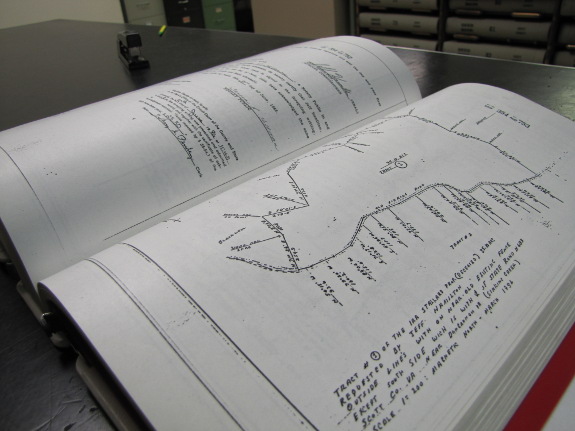
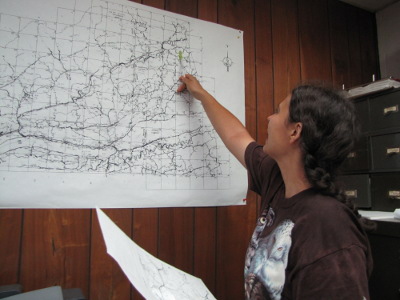 As Mark
mentioned, we spent
Wednesday afternoon at the county courthouse, finding information about
nearby properties. I learned how to do this when I was buying our
own farm, since a title search is essential to make sure you know what
you're getting into. You can either pay a lawyer to look for
liens (debts), sold mineral rights, pesky right-of-ways, etc. attached
to your potential property, or you can buckle down and do the research
yourself. Even after you own a piece of property, these skills
come in handy since you can use the same technique to figure out who
your neighbors are, or to find the assessed value and size of any
property in the county.
As Mark
mentioned, we spent
Wednesday afternoon at the county courthouse, finding information about
nearby properties. I learned how to do this when I was buying our
own farm, since a title search is essential to make sure you know what
you're getting into. You can either pay a lawyer to look for
liens (debts), sold mineral rights, pesky right-of-ways, etc. attached
to your potential property, or you can buckle down and do the research
yourself. Even after you own a piece of property, these skills
come in handy since you can use the same technique to figure out who
your neighbors are, or to find the assessed value and size of any
property in the county.
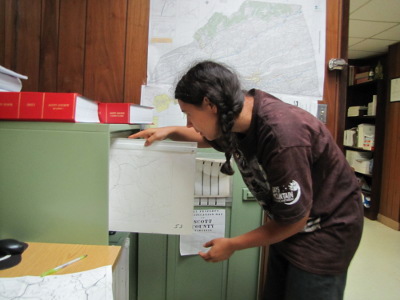 If your county has entered
the digital age, you might not have to jump through all of these hoops,
but here's what we did. In case you're curious, the photos are in
order (except for the first one), but don't match the written steps
they're beside --- a little artistic license.
If your county has entered
the digital age, you might not have to jump through all of these hoops,
but here's what we did. In case you're curious, the photos are in
order (except for the first one), but don't match the written steps
they're beside --- a little artistic license.
Step
1: Orient yourself. If you're looking up
information on a property in a rural area, it can be handy to pinpoint
the location by flipping back and forth between google maps' aerial
photo and plain map features. Once you zoom in far enough (at
least in our region), google maps shows the parcel boundaries on the
non-photographic map. Do this at home before you head to the
courthouse, and print out an annotated map to refresh your
memory. (While you're at it, pack your bag with a notebook, pen,
camera, and money for copies if you want to make any. Except for
using the copying machine, this project is cost-free.)
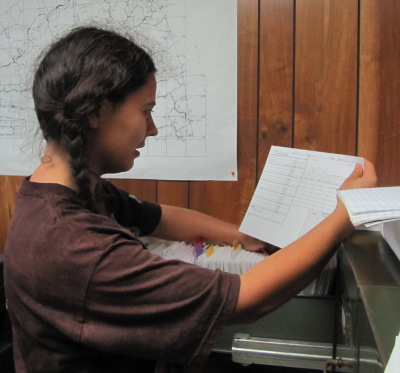 Step 2:
Find your tax map number. At the courthouse,
your first stop will be the tax assessor's office, where you'll
probably find a big map of the county on the wall. The lines mark
off the boundaries of smaller maps, which (in our courthouse at least)
are filed in a hanging cabinet. Pull out the proper map and
orient yourself using your prior research. (In our county, only
roads and creeks are shown on these maps, so it can be tough to find a
property if you haven't done some homework.) The tax map number
is the number of the map you used followed by the number of the parcel
--- for example: 47-90 for the property labeled 90 on the map labeled
47.
Step 2:
Find your tax map number. At the courthouse,
your first stop will be the tax assessor's office, where you'll
probably find a big map of the county on the wall. The lines mark
off the boundaries of smaller maps, which (in our courthouse at least)
are filed in a hanging cabinet. Pull out the proper map and
orient yourself using your prior research. (In our county, only
roads and creeks are shown on these maps, so it can be tough to find a
property if you haven't done some homework.) The tax map number
is the number of the map you used followed by the number of the parcel
--- for example: 47-90 for the property labeled 90 on the map labeled
47.
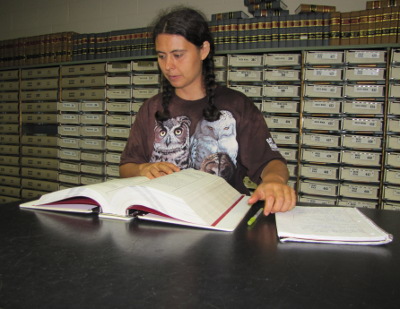 Step 3:
Find the assessment information for your property. Filing cabinets beside
the maps are divided up by map number, so you can just flip through
until you find the sheet that corresponds to the property you're
interested in. In our county, this sheet of paper gives all kinds
of fascinating information, including the name and address of the
owner(s), the acreage, the assessed value of the property, and
information on improvements. You should also write down the deed
information, which will be another two number series (this time a deed
book number followed by a page number).
Step 3:
Find the assessment information for your property. Filing cabinets beside
the maps are divided up by map number, so you can just flip through
until you find the sheet that corresponds to the property you're
interested in. In our county, this sheet of paper gives all kinds
of fascinating information, including the name and address of the
owner(s), the acreage, the assessed value of the property, and
information on improvements. You should also write down the deed
information, which will be another two number series (this time a deed
book number followed by a page number).
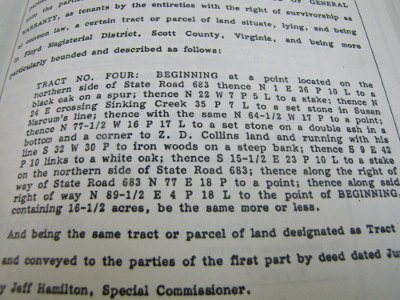 Step 4:
Find the most recent deed for the property. In our courthouse, you
have to go downstairs to the records department to look at deeds.
(The folks who work throughout the courthouse are often very friendly
and will help you out if you get confused or lost.) The deed
books are in numerical order, so pull out the correct one and flip to
the page listed on the tax assessment. In the deed book, you'll
learn when the current owners bought the property, from whom, and for
how much. In some cases, there will be a description (or map) of
the boundaries; in others, you will be referred to the previous sale of
the property for that information. The information in the deed
trumps the boundaries delineated on the tax map, so if your property is
a completely different shape in the two places (like ours is), the deed
is more likely to be correct.
Step 4:
Find the most recent deed for the property. In our courthouse, you
have to go downstairs to the records department to look at deeds.
(The folks who work throughout the courthouse are often very friendly
and will help you out if you get confused or lost.) The deed
books are in numerical order, so pull out the correct one and flip to
the page listed on the tax assessment. In the deed book, you'll
learn when the current owners bought the property, from whom, and for
how much. In some cases, there will be a description (or map) of
the boundaries; in others, you will be referred to the previous sale of
the property for that information. The information in the deed
trumps the boundaries delineated on the tax map, so if your property is
a completely different shape in the two places (like ours is), the deed
is more likely to be correct.
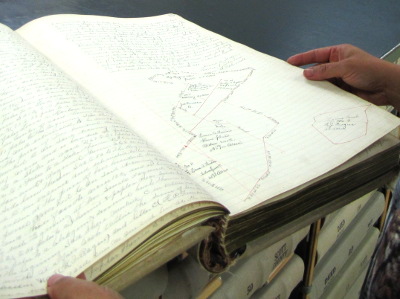 Step 5:
Read back through the deeds for the last hundred years or so. A complete title
search is only necessary if you're interested in buying a piece of
land, or if you're a history buff. It's pretty easy to follow the
land backwards --- each deed will refer to a previous deed book and
page --- but can get trickly if land has been split apart or lumped
together. I didn't go into depth with any of the properties we
were looking at this week since we're just putting out feelers, but
when I bought our farm, I went all the way back and even read the deeds
of neighboring properties to get more information about our
right-of-way.
Step 5:
Read back through the deeds for the last hundred years or so. A complete title
search is only necessary if you're interested in buying a piece of
land, or if you're a history buff. It's pretty easy to follow the
land backwards --- each deed will refer to a previous deed book and
page --- but can get trickly if land has been split apart or lumped
together. I didn't go into depth with any of the properties we
were looking at this week since we're just putting out feelers, but
when I bought our farm, I went all the way back and even read the deeds
of neighboring properties to get more information about our
right-of-way.
Extra
credit: While
you're there, you might want to flip through the earliest deed books
your courthouse has available. Ours date back to the late 1800s,
and the earliest ones are handwritten!
Want more in-depth information? Browse through our books.
Or explore more posts by date or by subject.
About us: Anna Hess and Mark Hamilton spent over a decade living self-sufficiently in the mountains of Virginia before moving north to start over from scratch in the foothills of Ohio. They've experimented with permaculture, no-till gardening, trailersteading, home-based microbusinesses and much more, writing about their adventures in both blogs and books.
Want to be notified when new comments are posted on this page? Click on the RSS button after you add a comment to subscribe to the comment feed, or simply check the box beside "email replies to me" while writing your comment.
- Remove comment
- Remove comment
- Remove comment
 ) Or maybe you'd like to write us a guest post about what you learned when you bought your farm? I'll be a lot of our readers would be interested!
) Or maybe you'd like to write us a guest post about what you learned when you bought your farm? I'll be a lot of our readers would be interested!
- Remove comment
- Remove comment
 )
)
- Remove comment
- Remove comment
- Remove comment

- Remove comment
- Remove comment
